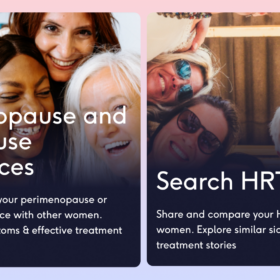
Can you get pregnant during perimenopause
What's the lowdown?
The perimenopause can last from a few months to as long as 10 years
During this time, periods start changing and some experience menopausal symptoms
In perimenopause, fertility declines, but ovulation can still happen so pregnancy is still possible
If you are perimenopausal and you are trying to conceive, start with regular sexual intercourse and prenatal vitamins
If you are perimenopausal and want to avoid pregnancy, there are a number of contraceptive options, including some that can help with menopausal symptoms.
Most people know that after menopause, it is no longer possible to get pregnant naturally. But what about the time just before that – the ‘perimenopause’? Is it possible to get pregnant before periods stop completely?
In this blog we take a quick look at the perimenopause, what it means for those trying to conceive, and why others shouldn’t be too quick to pack in the contraception!
The perimenopause is the transition phase where female hormones start to fluctuate, eventually leading to reduced levels of oestrogen. During this time, periods can change and become more irregular and sometimes longer or heavier. Other symptoms can also develop, e.g. hot flushes and fatigue.
As the levels of oestrogen decline, fertility dramatically reduces too. However, even though pregnancy during the perimenopause is unlikely, ovulation can still occur and therefore pregnancy is still a possibility.
So, for those trying to conceive during the perimenopause, this may be welcome news, but for those wishing to avoid pregnancy, it’s important that effective contraception is continued during the perimenopause (with STI protection if needed).
I’m perimenopausal and trying to get pregnant, what do I need to do?
As stated above, conceiving naturally during the perimenopause is possible but becomes more unlikely as age increases. People trying to get pregnant should follow the usual advice:
- Have regular sex every 2-3 days
- Maintain a healthy diet and weight
- Take folic acid (check you’re on the right dose through your GP or pharmacist) and vitamin D.
Getting pregnant can be a big hurdle for many in the perimenopause, and pregnancy can be a challenge afterward. Pregnancy after the age of 40 carries an increased risk of complications, including miscarriage, preeclampsia and foetal birth defects or genetic problems. It is important to see your healthcare provider soon after getting pregnant to get the right care and support during the pregnancy.
If you have struggled to conceive naturally during the perimenopause, there may be other options available, like IVF. Discuss this with your doctor, to explore the options available to you.
Can I still get pregnant on HRT?
The short answer is ‘yes’ you can still get pregnant on HRT! HRT is not contraception and many types will not affect ovulation or fertility. For people not wishing to become pregnant, contraception may be needed until age 55 (more on this below).
People who do want to get pregnant can continue on HRT to help manage perimenopausal symptoms. If pregnancy does occur whilst on HRT, the HRT should be stopped as soon as possible (if wishing to continue with the pregnancy). Pregnancy causes oestrogen and progesterone levels to skyrocket, giving a 9 month relief from perimenopausal symptoms (albeit exchanged for some other niggling symptoms)! After the baby has been delivered, HRT can be restarted.
The advice may be different if you have been diagnosed with primary ovarian insufficiency, so speak with your doctor or a clinician at Stella.
I’m perimenopausal – do I need contraception?
If you’re not trying to get pregnant, then yes – you do need contraception, but how long you need it for depends on your age.
If you reach the menopause and you’re under 50 years old, you should continue contraception for at least 2 years after your last period. If you are over 50, you should continue contraception until at least one year after your last period.
For those still having periods over the age of 50, you can stop contraception once you reach 55 years old, because after 55 it is assumed that most women will no longer be ovulating.
STI protection is also recommended at all ages if needed, i.e. a condom or diaphragm.
What contraception options do I have in the perimenopause?
There are two different types of contraception – hormonal and non-hormonal.
Non-hormonal options include barrier (e.g. condoms and diaphragms), the copper coil and natural family planning, and sterilisation.
Hormonal options fall into two categories: 1. Combined (containing both oestrogen and progestogen) or, 2. Progestogen-only options. The combined contraceptives can be taken until the age of 50, and during this time it can even help with menopausal symptoms. However, it won’t be suitable for everyone, particularly those with specific risk factors, e.g. history of blood clots or migraine with aura.
This is where the progestogen-only contraceptives can play a big role, and most forms have the added benefit of being safe to take until the age of 55. Progestogen-only options like the Mirena coil, can also be used alongside HRT. You can read more about the contraceptive options in the perimenopause here.
So am I pregnant or is this perimenopause?
It can be difficult to tell the difference between perimenopause and early pregnancy – as well as an absent period, both can have symptoms of fatigue, weight gain, brain fog, disturbed sleep and mood changes.
There are, however, some symptoms that are usually only seen in pregnancy or perimenopause.
In pregnancy, there is increased oestrogen and progesterone, which leads to breasts increasing in size and breast tenderness. There is also increased vaginal discharge, and some will experience nausea and vomiting.
In perimenopause, many will experience erratic hot flushes and may have vaginal symptoms like vaginal dryness and discomfort.
Remember that menopause is not diagnosed until it has been at least two years since your last period if you’re under 50, or at least one year since your last period if you’re over 50.
So if you are sexually active and you’re in any doubt about whether your symptoms are pregnancy or perimenopause – please get a pregnancy test from your local pharmacy!
Our medical review process
This article has been medically reviewed for factual and up to date information by a Lowdown doctor.






